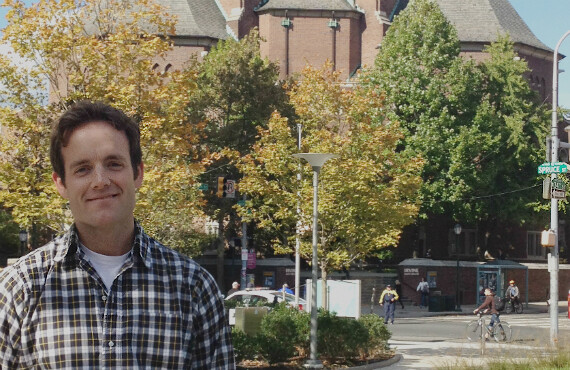Penn Student Moves from Military Service to Family Medicine
Many people decide to go back to school later in life to pursue an entirely different career. At the University of Pennsylvania, one non-traditional student’s experiences revolutionized his way of thinking about humanity, and he says the switch from chasing bad guys in Afghanistan to healing sick patients isn’t really so different, after all.
Jonathan Wood is a first-year student at Penn’s Perelman School of Medicine. At 32, Wood, a native of Northfield, Mass., is the oldest student in his cohort.
He participated in the Air Force Reserve Officer Training Corps program while an undergraduate at Yale University. When the two World Trade Center towers fell on Sept. 11, 2001, he was a junior studying classic literature. He was commissioned as an Air Force officer soon thereafter.
For eight years, he served as an intelligence officer, earning the rank of captain.
During his military service, Wood participated in intelligence efforts that shadowed emerging terrorist cells overseas. For a while, he was embedded in special operations units, during which his mission was to quietly follow Al Qaeda leaders, monitoring the trans-national network and its many safe havens.
For five of his eight years, Wood worked with para-rescue units, assisting with medical planning, focusing on emergency medicine and mass-casualty triage and providing a continuity of care during evacuation operations. He also conducted threat-and-terrain analyses for combat search and rescue missions, safely executing more than 40 missions.
His active-duty service also took him to the Philippines as a military counter-insurgency advisor and joint-military exercises with his counterparts in Indonesia and Australia.
“It was hard, frustrating work,” Wood recalls. “I was a close witness to both impressive and disappointing aspects of American counter-terrorism.’
After leaving the Air Force, Wood was not sure he wanted to pursue medicine. So he spent three months in Uganda, Zambia and the Congo, shadowing doctors to learn the scope of what it is that they do. Then, back in the U.S., he spent a month with doctors in Memphis.
Wood had anticipated the health disparities that he found in Africa. But he was taken aback by the dramatic health disparities he found in Memphis.
“It was especially shocking to see how racially segregated our cities are and how badly our health infrastructure penetrates poor minority communities,” Wood explains.
The doctors in Memphis opened clinics in underserved neighborhoods, but they were still commuting from their homes in the suburbs.
“In time they came to see the limitations of being ‘outside helpers,’” says Wood, “which did little to address underlying injustice or the resulting social fault lines and mistrust.”
Eventually, the doctors decided to buy homes in the community and move in as long-term neighbors.
At first, Wood was hesitant about the idea of living somewhere “uncomfortable.”
“I’d always maintained a beautiful, quiet rural home as a sanctuary from my work life, I thought I deserved it,” Wood says. “But, I suddenly felt like I’d shuttered myself away from ugly social realities and from responsibilities. Perhaps the residential choices I’d been making had a big moral dimension I’d ignored.”
He was haunted enough by the idea that he moved, after locating in Baltimore, into a neighborhood called Sandtown. He expected it to be difficult, and it was.
“It stirred up all kinds of uncomfortable latent prejudices about race and class, but it was wonderful in many more ways,” Wood explains.
As relationships grew, Wood says, he was humbled and slowly transformed.
“My attitudes began softening, neighbors reached out to me with enthusiasm and I felt like the windows and doors of my heart were thrown open to community in a whole new way. Even awkward interactions with neighbors felt healthy, like long-unused social muscles were finally getting a good stretch.”
The jump from military service to medicine isn’t all that far, he says.
“Penn Medicine places a remarkable pedagogical emphasis on teamwork, and, coming from the military, that was music to my ears,” Wood says. “It’s also a school with tremendous resources, where you can really do anything. And it’s situated in a great, always-sunny city with medically under-reached populations, which is an interest of mine.”
Wood says he may some day return to the reserves as a physician because he places such value on the mission and military relationships. But, he feels a certain calling to become a community doctor in a low-income neighborhood and to live as a long-term home-owning neighbor within the same community. So, it’s no surprise that he’s packing up his boxes for another move either to North Philadelphia or Camden, N.J.
“With some luck, I might one day be able to practice community medicine there as a neighbor-physician,” he says. “A lot of Americans live in places where physicians don’t normally buy homes, and I suspect that physical separation is bad for all of us, contributing to barriers and misunderstandings between society and health care.”








